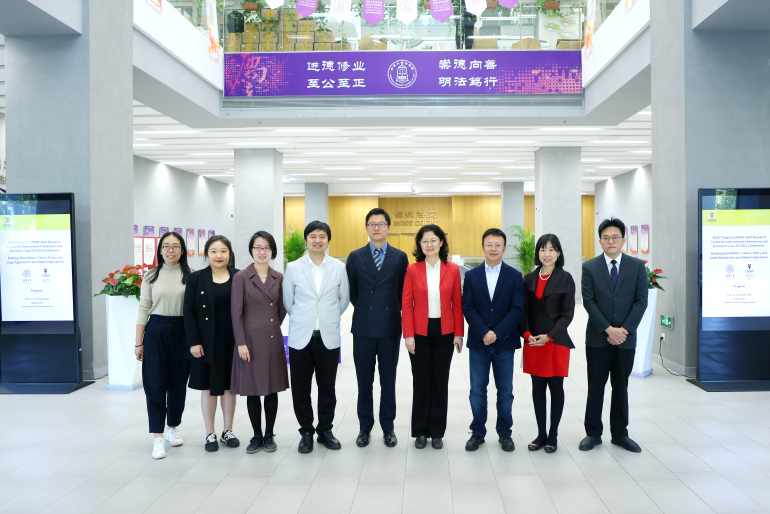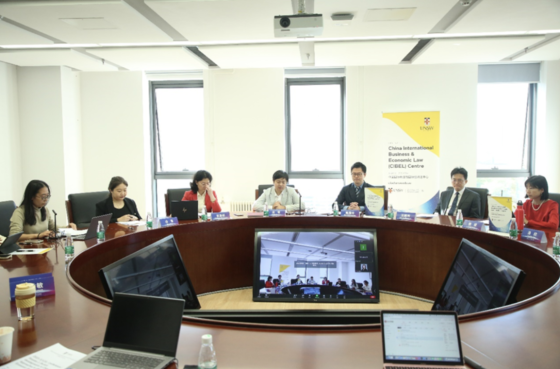15 December 2023
Jointly hosted by UNSW Law & Justice and Tsinghua Law School, the 2023 JCICEL Conference was held on the 16 October in Tsinghua University. This conference aims to bring together researchers from Tsinghua Law School and UNSW Law & Justice to discuss the policy and regulatory developments in a wide range of fields including international trade law, international investment law, banking & finance law, intellectual property law, corporate law, competition law, environmental law, and dispute resolution, focusing on cutting-edge issues faced by China on the journey to ‘building back better’.
The speakers at the conference included faculty members of Tsinghua Law School. Among them were Associate Professor Haifeng Deng (Assistant Dean), Associate Professor Jun Long (Associate Dean of International Affairs), Associate Professor Simin Gao (Associate Dean), Professor Xin (Sean) Tang, Professor Guobin Cui, Professor Chenying Zhang, and Associate Professor Zhaohui Shen. Joining them were Associate Professor Weihuan Zhou (Co-Director of JCICEL), Associate Professor Kun Fan, Dr Lu Wang, Professor Deborah Healey (Deputy Director of JCICEL) and Dr Xue (Sophia) Bai from UNSW Law & Justice.
Associate Professor Jun Long and Associate Professor Weihuan Zhou delivered the Opening addresses. Associate Professor Jun Long, Associate Dean (International), Tsinghua University Law School, extended a warm welcome to the attendees, highlighting the recent academic research achievements of Tsinghua University Law School in the fields of international business and economic law. He affirmed the significance of the annual conference hosted by JCICEL that both universities are committed to. Associate Professor Weihuan Zhou, Co-Director of JCICEL spoke on behalf of Professor Christine Forster, Associate Dean International of UNSW Law & Justice. He highlighted UNSW’s strong commitment to collaborating with Tsinghua University Law School. He also expressed gratitude for their robust support in organising the conference which created an excellent platform for communication and exchange between faculty members of the two universities.
Session 1 of the conference titled “Building Back Better: China’s Policy and Legal Approaches and Global Implications” was chaired by Professor Debora Healey. Professor Chenying Zhang delivered a presentation on “China’s Approaches to Cross-border Data Flow”. She recognised the complexity and sensitivity of the issues related to cross-border data flow. This topic not only involved economic issues such as international trade, but also non-economic matters like privacy protection, national security, and sovereign jurisdiction. Associate Professor Kun Fan provided a comprehensive analysis of China's specific approaches to dispute resolution within the "Belt and Road" initiative. She delved into various perspectives including primary methods, experiential approaches, cultural foundations, and socio-economic factors relating to the initiative. Dr Lu Wang spoke on “China's Approach to Investor-State Dispute Settlement (ISDS) Reform: Opportunities and Challenges”. She provided an in-depth presentation on the topic.
Professor Deborah Healey concluded this session by summarising the presentations, followed by a panel discussion.
The second session focused on “Recent developments in China’s Approaches to Domestic Economic Governance” and was chaired by Associate Professor Kun Fan. Associate Professor Zhaohui Shen presented on “The Effect of the Forthcoming Corporate Law on Foreign-Invested Enterprises in China”. His presentation covered aspects such as shareholder contributions, corporate governance structures, duties and powers of shareholder meetings and board of directors, share issuance, shareholder rights, equity transfers, and director responsibilities. Dr Bai Xue spoke on the “Fair Competition Review System: The Australian Insights for China”. She shared her thoughts on China’s Fair Competition Review System, exploring dimensions such as its scope and exemptions, participating entities, institutional standards and regulatory mechanisms. Professor Xin Tang presented on “Theoretical Reconstruction of Civil Liability for Insider Trading under PRC Securities Law”. He discussed the theoretical controversies surrounding insider trading in current Securities Law. He also spoke about the impact of dual protective measures in the PRC Securities Law on both investors and the market. The session concluded with a discussion among the speakers moderated by Associate Professor Kun Fan.
Associate Professor Simin Gao chaired the third session titled “Emerging Challenges for Digital and Green Transitions.” Associate Professor Haifeng Deng presented on “Discussion on the Legal Issues of China’s Coastal Wetlands”. He proposed incorporating the concept of natural ecological spaces in coastal wetlands conservation. Professor Guobin Cui presented on The Regulation of Algorithmic Recommendations under the Copyright Law”. Next, Associate Professor Weihuan Zhou provided his perspective on “China’s Strategies on Critical Minerals in a Green Transition and Global Implications.” The presentations were followed by a discussion between the speakers.
The Closing Remarks were delivered by Associate Professor Jun Long and Associate Professor Weihuan Zhou. Associate Professor Jun Long mentioned that the engaging presentations and in-depth discussions have been beneficial in enhancing the understanding of policies and legal research and that he looks forward to the long-term collaboration between Tsinghua University Law School and UNSW Law & Justice. Finally, he congratulated the success of the conference.
Associate Professor Weihuan Zhou hoped that the reflections and discussions throughout the conference will contribute to advancing China’s regulatory developments and global influence in these fields. He also expressed his gratitude to all speakers for their contributions to the conference. UNSW is looking forward to strengthening collaboration with Tsinghua Law School in the coming years, aiming to enhance the quality and global impact of joint research projects and activities.

